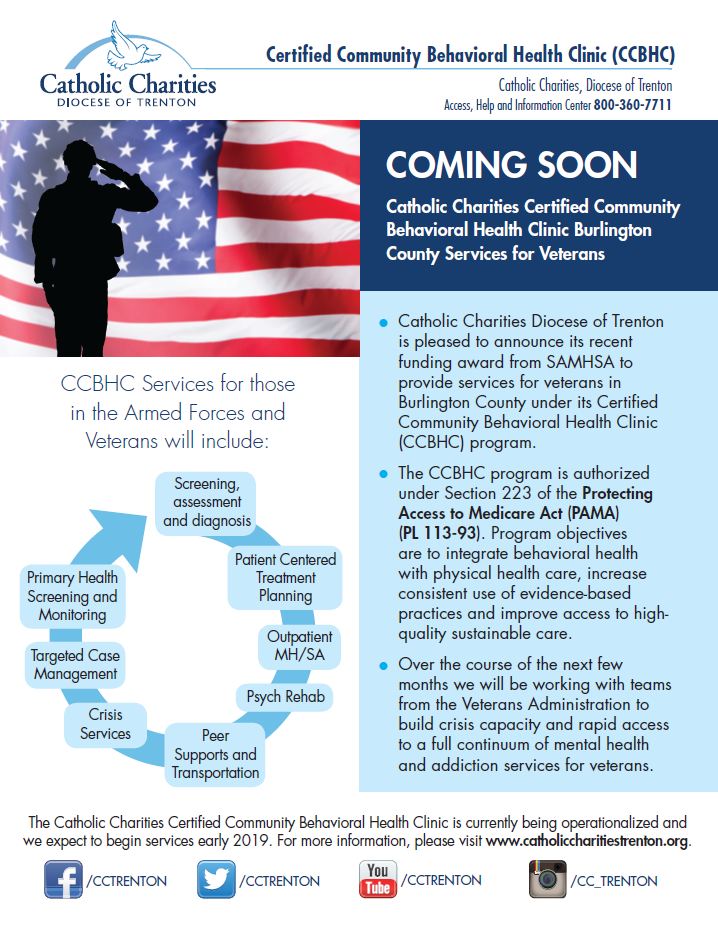Mental health, addiction services to expand for veterans
 Catholic Charities, Diocese of Trenton is expanding mental health and addiction services in Burlington County to serve military veterans.
Catholic Charities, Diocese of Trenton is expanding mental health and addiction services in Burlington County to serve military veterans.
The additional services – expected to be available in early 2019 – were funded through the federal Substance Abuse and Mental Health Services Administration (SAMHSA), which awarded Catholic Charities a $4 million, two-year grant in September to expand its Certified Community Behavioral Health Clinic (CCBHC).
Since Catholic Charities’ CCBHC launched in July 2017, the Veterans Administration (VA) has referred veterans to the agency’s Early Intervention Support Services (EISS) in Mercer County, where clinical staff have completed the Treating Combat Veterans: Evidence-Based Practices training through the New Jersey Association of Mental Health & Addiction Agencies, Inc.
An underserved population
Under the expansion grant, Catholic Charities will provide rapid-access, crisis veterans services, supported employment, and peer transportation services, including a handicapped-accessible van, based out of the agency’s Delaware House in Westampton, Burlington County.
More than 10 percent of Burlington County’s 449,284 residents are veterans, according to 2016 census data.
But it’s an underserved population, partly because the majority of veterans reside in the western side of the 820-square-mile county, while the sole VA facility is located on the eastern side.
Economic stressors, such as homelessness and unemployment, also pose barriers to treatment for veterans. Six percent of county residents are uninsured, according to the 2018 Robert Wood Johnson Foundation County Health Rankings. And Burlington County has one of the highest opioid prescription rates (how many opioid prescriptions per 100 people) of the state’s 21 counties, according to the U.S. Centers for Disease Control, putting veterans at a high risk for opioid addiction.
Reaching out to veterans
The expansion funding will be used to help veterans access needed treatment.
 “We have begun participating in community veterans-outreach events, including one recently sponsored by the Burlington County Sheriff’s office,” said Susan Loughery, Catholic Charities director of operations (pictured at left).
“We have begun participating in community veterans-outreach events, including one recently sponsored by the Burlington County Sheriff’s office,” said Susan Loughery, Catholic Charities director of operations (pictured at left).
SAMHSA estimates there are 23.4 million veterans in the United States. Nearly 20 percent of service members returning from Iraq or Afghanistan have post-traumatic stress disorder (PTSD) or depression, and 19.5 percent suffered a traumatic brain injury during deployment, according to SAMHSA. Substance abuse can aggravate such disorders.
Yet only half of returning service members who need treatment for mental health conditions seek it, and nearly half of those get inadequate treatment, according to SAMHSA. Foregoing treatment can have a deadly toll. Veterans are 1.5 times more likely to take their own lives than people without military experience, according to government data.
For help: Call our Access, Help and Information Center at 1-800-360-7711 to connect with professional care.
To subscribe to our blog posts and news releases, fill out the fields below.
